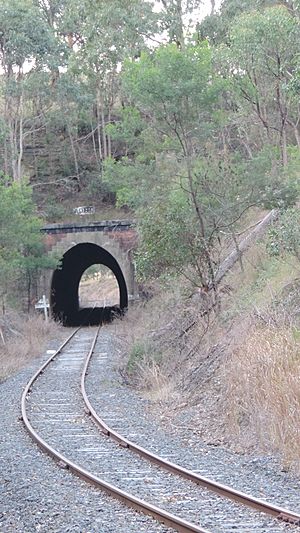Dalveen Tunnel facts for kids
Quick facts for kids Dalveen Tunnel |
|
|---|---|

Dalveen Tunnel on the Southern railway line, 2015
|
|
| Location | Warwick to Wallangarra railway line, Dalveen, Southern Downs Region, Queensland, Australia |
| Design period | 1870s - 1890s (late 19th century) |
| Built | 1878 - 1880 |
| Official name: Dalveen Tunnel | |
| Type | state heritage (built) |
| Designated | 28 July 2000 |
| Reference no. | 601519 |
| Significant period | 1870s, 1880s (fabric) |
| Significant components | tunnel - railway, cutting - railway |
| Builders | J Garget |
| Lua error in Module:Location_map at line 420: attempt to index field 'wikibase' (a nil value). | |
The Dalveen Tunnel is a special old railway tunnel in Dalveen, Queensland, Australia. It is part of the Warwick to Wallangarra railway line. This tunnel was built a long time ago, between 1878 and 1880, by a builder named J Garget. Today, it is listed on the Queensland Heritage Register, which means it's an important historical place.
Contents
Dalveen Tunnel: A Historic Railway Passage
The Dalveen Tunnel is located about 183 miles (295 kilometres) from Roma Street railway station in Brisbane. It sits on a railway line that connects the towns of Warwick and Wallangarra, Queensland. Imagine trains from the past rumbling through this very tunnel!
What is the Dalveen Tunnel Made Of?
This tunnel has a unique shape, like a half-circle or an oval. It is mostly built from strong bricks. The inside of the tunnel is lined with bricks, and the arched openings at each end are also made of brick.
The entrances to the tunnel, called "portals," have special decorative stones. These stones are called quoins and are made from sandstone. On the southern entrance of the tunnel, you can even see the year "1880" carved into the stone. This tells us when that part of the tunnel was finished.
Building the Tunnel: A Look Back
Building a railway tunnel in the late 1800s was a huge job! Workers had to dig through solid ground and rock. They then carefully built the tunnel walls and arches using thousands of bricks. This was all done without the big machines we have today. The Dalveen Tunnel is a great example of the engineering skills from that time.
Why is the Dalveen Tunnel Important?
The Dalveen Tunnel is important because it is a reminder of Queensland's railway history. Railways were vital for moving people and goods across the state. This tunnel helped connect different towns and allowed for trade and travel. Because it is so well-preserved and shows how tunnels were built back then, it was added to the Queensland Heritage Register on 28 July 2000. This protects it for future generations to see and learn from.
 | Shirley Ann Jackson |
 | Garett Morgan |
 | J. Ernest Wilkins Jr. |
 | Elijah McCoy |

